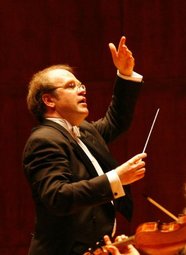 Conductor Bernard Labadie.
Conductor Bernard Labadie. Bernard Labadie often lives out of a suitcase, much like a salesman or a consultant or a diplomat. He isn’t in any of those three professions, though as a guest conductor he must do all of them. Stepping in front of an unfamiliar orchestra demands a salesman’s instincts, a consultant’s problem-solving skills and a healthy dose of diplomacy.
“I’d say I spend about 60 percent of my time guest-conducting,” said the 50-year-old French Canadian, in a recent interview from a New York hotel. “I’m on the road close to six months a year.”
“Right now I’m conducting the New York Philharmonic,” he continues. “I spent September conducting in Malaysia, New Zealand and Australia. And in December I’ll be in London, leading the Academy of Ancient Music. Then in January, I’ll be in Germany — in Hamburg, Cologne, Munich and other places.”
Kansas City is also on Labadie’s itinerary. In three concerts next weekend at the Kauffman Center for the Performing Arts, he’ll conduct Wolfgang Amadeus Mozart’s Symphony No. 31, a suite from Jean-Philippe Rameau’s Dardanus and Gabriel Faure’s Requiem, performed by the Kansas City Symphony and Chorus.
So what has made Labadie the visiting conductor so many orchestras want? The answer to that question can be found in some classical music trends.
A few decades ago, a kind of Berlin Wall cut across the classical music world. On one side were the big, modern symphony orchestras, playing with a smooth and polished sound. And on the other side were the early music specialists, offering a more “authentic” experience — delicate textures and ornamented melodies, played on original instruments.
Then along came Labadie. In 1984 he founded an orchestra in his hometown of Quebec City called Les Violons du Roy. Using modern instruments to play baroque and classical music in “period” style, the ensemble stood halfway between the two hostile camps.
After almost 30 years leading his hybrid ensemble in Quebec City, he’s now in a position to offer his services to orchestras around the world — a kind of bridge between old and new. These days, even the grandest symphony orchestras are interested in bringing a strong sense of period style to their performances.
“That’s why I’m being hired,” Labadie states bluntly. “For many modern orchestras, period performance is like a crash course in a foreign language. But now in America I have a network of orchestras that know me. So we don’t start from scratch, we build on what we’ve learned already. That way, progress is quicker and more efficient.”
One of the ensembles in his growing network is the Kansas City Symphony. Labadie’s guest spot with the orchestra will be his third in as many years.
“It’s a great orchestra,” he says of the locals. “There are a lot of young players, and they’re very open-minded. And of course the new hall is very successful.”
Flying in to lead an orchestra that isn’t his own is a task that Labadie acknowledges comes with many challenges.
“It’s a very short relationship,” he says. “We usually meet for four rehearsals, and then a couple of performances. So you need to adapt quickly. But with experience you learn how to do it. You learn to identify the strengths of an orchestra, and how to build trust.”
Labadie goes on to explain that the kind of trust a guest conductor needs to establish can be compounded when the conductor is trying to teach experienced musicians a new way to approach music they’ve been playing for years. But he believes that it’s getting easier all the time to teach old dogs new tricks.
“You can’t turn a modern symphony orchestra into a Baroque ensemble in two or three days,” he says. “The idea is to get the players to capture the spirit and essence of the music. Today there’s a new generation of players who usually have some basic education in period style. And some older musicians are also very open-minded about it, as well."
“American orchestras may not be as far along as European orchestras, because period performance practice was born in Europe. But things are improving here. I meet with less and less resistance all the time.”
As for his own orchestra, Labadie is stepping down as the artistic director of Les Violons du Roy. He’ll retain his position as leader of his choir, La Chapelle de Québec. And he’s not currently looking for a another full-time job.
“I will bear the title ‘founding conductor’ of Les Violons du Roy,” he says with pride. “I won’t disappear completely. It’s my baby, but the baby is now grown up.”
© Colin Eatock 2013
 RSS Feed
RSS Feed

